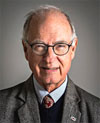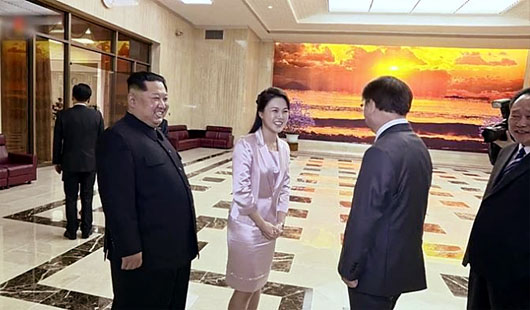Special to WorldTribune.com
 By Donald Kirk
By Donald Kirk
SEOUL — U.S. President Donald Trump is putting the best face on the agreement for North and South Korean leaders to meet next month at the truce village of Panmunjom, on the North-South line 55 kilometers north of Seoul for the third inter-Korean summit.
Despite pervasive doubts about North Korea’s sincerity or the possible outcome of such a meeting, Trump tweeted, “Possible progress being made in talks with North Korea.” Indeed, he said, “For the first time in many years, a serious effort is being made by all parties concerned.”
Realistically, Trump said ” the U.S. is “ready to go hard in either direction” but cautioned against raising “false hope” while “the world is watching and waiting.”

The question asked in Washington is whether the sudden announcement of the upcoming summit between North Korea’s leader Kim Jong-un and South Korea’s President Moon Jae-In marks a dramatic potential step toward inter-Korean harmony. Is it really a dividend of moves toward peace initiated at last month’s Winter Olympics in the South Korean mountain district Pyeongchang or just another ruse by the North to drive a wedge between the U.S. and South Korea?
From Trump on down, top leaders in Washington are obviously skeptical – and maintained the U.S. has to pursue a tough policy on sanctions as well as military exercises, which South Korean and U.S. forces have agreed to begin soon after the Paralympics end in ten days.
Vice President Mike Pence, who attended the opening ceremony of the Winter Olympics last month, sitting stony-faced one row in front of Kim Jong-Un’s younger sister, Yo-Jong, in the VIP box, declared, “We will be firm in our resolve: while the “the United States and our allies remain committed to applying maximum pressure on the Kim regime to end their nuclear program.”
Pence even said “All options are on the table” even though moves toward a North-South summit clearly rule out any chance of the U.S. exercising the “military option,” including a preemptive strike on the North’s nuclear and missile facilities.
Analysts recalled that Pence had been supposed to meet a North Korean official while in Korea last month but the meeting was cancelled, apparently because the North Koreans did not want to hear him insisting they give up their nuclear program. “Our posture toward the regime will not change,” Pence said, “until we see credible, verifiable, and concrete steps toward denuclearization.”
The U.S. intelligence community took a somewhat less outspoken view.
“Hope springs eternal,” said Dan Coats, director of National Intelligence, at a hearing of the senate armed services committee in Washington, “but we need to learn a lot more relative to these talks.” Meanwhile, he promised that intelligence analysts would “continue to do every possible collection and assessment we can relative to the situation that exists in North Korea.”
Washington officials will be looking for more details when Chung Eui-Yong, national security adviser, goes to Washington this week with Suh Hoon, director of the National Intelligence Service, to tell them all about their remarkable meeting with Kim Jong-Un in Pyongyang on Monday.
Chung will be showing the Americans a message from Kim in which the North Korean leader is believed to have expressed his willingness for North Koreans and Americans to negotiate an end to the current impasse over his nuclear weapons program.
Kim, said Chung, fortified that promise with assurances that American leaders are likely to greet with skepticism. Analysts quickly noted that Kim hoped, by agreeing to holding a summit so soon, to throw off planning for U.S.-Korean military exercises.
Both Moon and Trump have affirmed the war games will be held as scheduled, but South Koreans are sure to express doubts as to whether they are a good idea in the run-up to what would be the third inter-Korean summit – the first since the late Roh Moo-Hyun met Kim Jong-Il in Pyongyang in 2007.
Roh’s predecessor, the late Kim Dae-Jung, flew to Pyongyang in June 2000 for the first inter-Korean summit while pursing his “Sunshine policy” of North-South reconciliation.
This summit would be fundamentally different from the other two in one aspect.
The agreement to meet at Panmunjom, where the Korean War armistice was signed in 1953, means that Moon would not be in the position of going as a supplicant to Pyongyang. Rather, the two would be meeting on equal, neutral ground – symbolic of their mutual desire to keep up the momentum generated by the Olympics.
“The North side,” said Chung at a briefing at the Blue House, the presidential residence and office complex, “clearly affirmed its commitment to the denuclearization of the Korean Peninsula and said it would have no reason to possess nuclear weapons should the safety of its regime be guaranteed and military threats against North Korea removed.”
In fact, said Chung, reporting on his visit to Pyongyang on Monday at which he and other members of his delegation were hosted to dinner by Kim Jong-Un, “the North promised not to use not only nuclear weapons but also conventional weapons against the South.”
Kim was said to have described that conversation as “open-hearted,” but there was no hint that the two sides would agree right away to a summit. Kim invited Moon to the summit three weeks ago in a letter that his sister, Yo-Jong, personally handed to Moon after attending the opening of the Olympics in Pyeongchang.
Moon at the time said agreeing to a summit depended on “the right conditions.” Clearly Kim Jong-Un came through with responses that Moon decided after Chung returned from Pyongyang earlier Tuesday were acceptable.
First and foremost, said Chung, Kim agreed “the denuclearization issue may be discussed as an agenda for the North-U.S. dialogue” – an understanding that marked a clear departure from North Korea’s previous refusal to discuss the nuclear issue at all.
Indeed, said Chung, Kim “has clearly stated that the denuclearization of the Korean Peninsula was an instruction of his predecessor” – that is, his father, Kim Jong-Il, who ruled for nearly 18 years before dying in 2011. Kim, said Chung, said “there has been no change to such an instruction.”
On the streets of Seoul, as might be expected, Koreans responded with feelings ranging from exhilaration to skepticism. “This is great,” said Kim Han-Jin, a young salaryman. “We should keep talking until the North is denuclearized.” Another person, who did not want her name used, said “the U.S. should cooperate instead of making threats against North Korea.”
Korean conservatives, however, see it quite differently view. “President Moon is falling for Kim Jong-Un’s double talk,” said a middle-aged man. “He won’t give up anything. He wants to weaken our defenses.”
